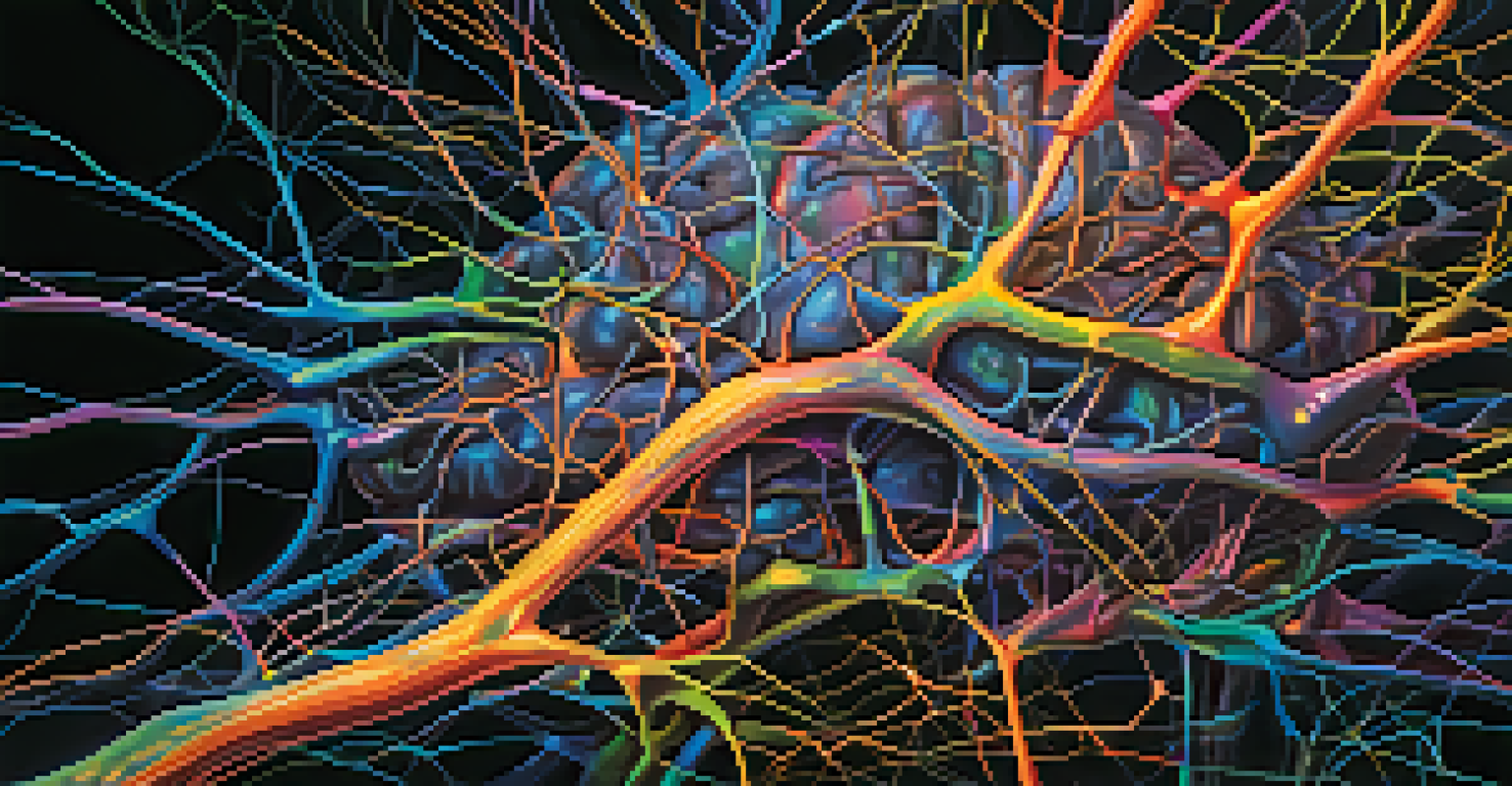The Impact of Psychedelics on Neural Plasticity and Repair

Understanding Neural Plasticity: The Brain's Flexibility
Neural plasticity refers to the brain's remarkable ability to change and adapt. This flexibility is crucial for learning, memory, and recovery from injury. Just like a tree that can grow new branches in response to changes in its environment, our brains can rewire themselves to optimize function.
The brain is a world consisting of a number of universes, and each universe is a world of its own.
The concept of plasticity isn't new; it's been a staple in neuroscience for decades. However, recent research has highlighted how certain substances, particularly psychedelics, can play a significant role in enhancing this adaptability. By promoting the growth of new connections between neurons, psychedelics may support cognitive functions and emotional resilience.
As we delve deeper into this topic, we'll explore how psychedelics can potentially enhance neural plasticity and what that means for brain repair and overall mental health.
Psychedelics: A Brief Overview of Their History and Use
Psychedelics, like psilocybin and LSD, have been used for centuries in various cultures for spiritual and healing purposes. Their resurgence in modern medicine is largely due to a growing body of evidence showing their potential therapeutic benefits. In recent years, clinical trials have explored their use in treating mental health disorders, such as depression and PTSD.

Historically, psychedelics faced a backlash in the mid-20th century, leading to restrictions that stifled research. However, the tide has been turning, with universities and institutions now investigating their effects on mental health and brain function. This renewed interest offers a promising glimpse into how these compounds could transform our understanding of mental well-being.
Neural Plasticity Enhances Learning
Neural plasticity allows the brain to adapt and rewire itself, crucial for learning and recovery from injury.
Understanding the historical context of psychedelics sets the stage for examining their impact on neural plasticity. By appreciating their journey, we can better grasp their potential in modern neuroscience.
The Science Behind Psychedelics and Neural Plasticity
Research indicates that psychedelics may enhance neural plasticity by promoting the release of brain-derived neurotrophic factor (BDNF). BDNF is a protein that supports the survival of existing neurons and encourages the growth of new ones. Think of it as fertilizer for the brain, helping it flourish and adapt.
Psychedelics can help us understand the mind and the brain in a way that we never have before.
One study found that psychedelics can increase synaptogenesis, the process by which new synapses are formed, thereby fostering better communication between neurons. This enhanced connectivity can lead to improved cognitive functions and emotional regulation. Imagine your brain as a bustling city; psychedelics might help build new roads, easing traffic and enhancing overall flow.
By understanding the science behind how psychedelics influence neural plasticity, we can uncover their potential as therapeutic agents in treating various neurological and psychological conditions.
Psychedelics and Brain Repair: A Potential Breakthrough
The potential for psychedelics to aid in brain repair is a captivating aspect of current research. Damage from trauma, stroke, or conditions like Alzheimer's can severely impair brain function. However, studies suggest that psychedelics may promote healing by enhancing neuroplasticity and facilitating recovery.
For example, in animal studies, substances like psilocybin have shown promise in inducing neurogenesis, the process of generating new neurons. This could lead to breakthroughs in treating brain injuries and neurodegenerative diseases. Consider it akin to finding a new route that helps a community recover from a natural disaster.
Psychedelics Promote Brain Repair
Research suggests psychedelics may enhance neuroplasticity, potentially aiding in recovery from brain injuries and disorders.
As researchers continue to explore these possibilities, the idea of using psychedelics for brain repair presents an exciting frontier in medicine.
The Role of Psychedelics in Treating Mental Health Disorders
Psychedelics are increasingly being studied for their potential to treat various mental health disorders, including anxiety, depression, and PTSD. The mechanisms behind their effectiveness often tie back to their ability to enhance neural plasticity. By fostering new patterns of thought and behavior, psychedelics can help individuals break free from the cycles of mental distress.
In clinical trials, patients have reported profound shifts in perspective and emotional healing after guided psychedelic sessions. These experiences often lead to increased openness and resilience, making it easier to cope with life's challenges. Imagine shedding an old skin, revealing a more vibrant self underneath.
The intersection of psychedelics and mental health treatment highlights the need for continued research and open discussions about their potential benefits and risks.
Safety and Ethical Considerations in Psychedelic Research
While the benefits of psychedelics are promising, safety and ethical considerations must remain at the forefront of research. Ensuring that these substances are used responsibly and under professional guidance is crucial to preventing misuse and potential harm. Just like any powerful tool, psychedelics require careful handling.
Building a framework for safe usage involves rigorous clinical trials and transparent communication about the risks and benefits. Participants in studies must be well-informed and supported throughout the process. This ethical approach not only safeguards individuals but also enhances the integrity of the research.
Therapeutic Potential of Psychedelics
Psychedelics show promise in treating mental health disorders by fostering new thought patterns and emotional resilience.
As we continue to uncover the potential of psychedelics, it’s vital to maintain a balanced perspective, prioritizing safety and ethical standards in pursuit of scientific advancement.
Looking Ahead: The Future of Psychedelics in Neuroscience
The future of psychedelics in neuroscience looks bright, with ongoing studies poised to unveil more about their effects on neural plasticity and brain repair. As our understanding deepens, these substances may become integral tools in treating a variety of mental health conditions and enhancing cognitive function. It's an exciting time for both researchers and those seeking alternative therapies.
Moreover, the cultural shift towards acceptance and de-stigmatization of psychedelics is paving the way for more extensive research and clinical applications. With increasing numbers of healthcare professionals advocating for their use, the dialogue surrounding psychedelics is evolving. Think of it as a blossoming garden, where new ideas take root and flourish.

As we look ahead, the intersection of psychedelics and neuroscience promises to reveal transformative insights, potentially reshaping our approach to mental health and brain health.